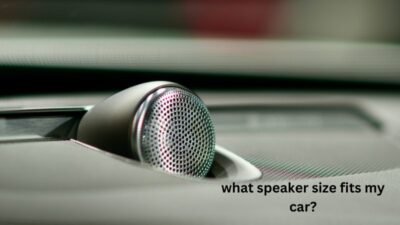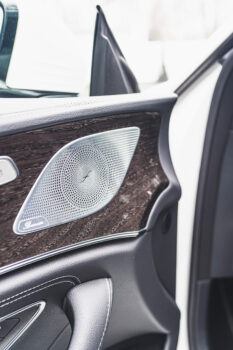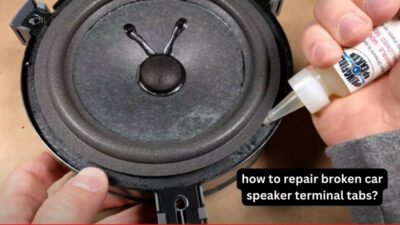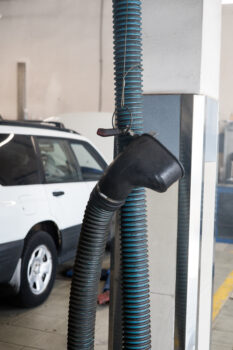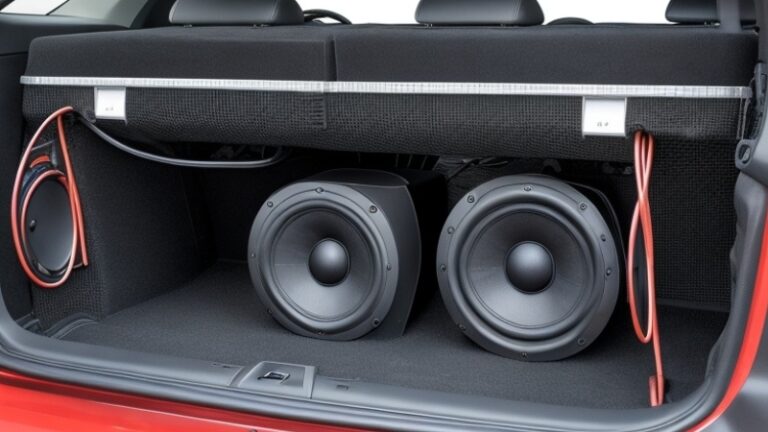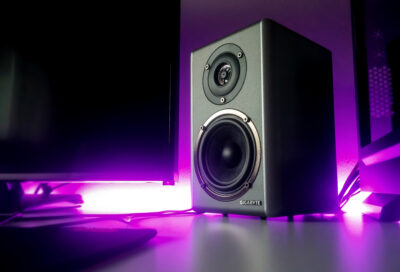what speaker size fits my car?
Today we discuss what speaker size fits my car. In the world of car audio, upgrading your speakers can significantly enhance your driving experience. Whether you are a music enthusiast or simply want better sound quality during your commute, selecting the right speaker size is crucial. A well-matched speaker size can make a substantial difference in the audio performance of your car’s sound system. But how do you determine the perfect fit for your vehicle? This article aims to guide you through the process, helping you find the ideal speaker size that suits your car’s audio needs.
Understanding Speaker Size and its Importance:
Car speakers come in various sizes, typically measured in inches. The size refers to the diameter of the speaker cone, and it directly influences the audio output’s quality and characteristics. Larger speakers generally produce deeper bass and more robust sound, while smaller speakers excel in producing clearer mid and high frequencies.
Determining the Right Speaker Size for Your Car:
1. Assessing Your Car’s Speaker Size
Before diving into the world of car audio upgrades, it’s essential to know your car’s current speaker size, if any. You can do this by checking the owner’s manual or looking up your car’s specifications online. Understanding the existing speaker size gives you a starting point for choosing replacements or upgrades.
2. Consider the Existing Speaker Size (If Applicable)
If your car already has factory-installed speakers, consider whether you want a simple replacement or a more substantial upgrade. Stick to the existing size if you’re content with the current sound quality and just need to replace a faulty speaker. However, if you seek improved audio performance, upgrading to larger, higher-quality speakers might be the right choice.
3. Identifying Speaker Locations in Your Car
Different car models have varying speaker placements. The most common locations include the front doors, rear doors, dashboard, and rear parcel shelf. Identify these locations to determine the sizes of speakers that will fit seamlessly. Some cars have designated spaces for specific speaker sizes, while others might require custom modifications.
Factors to Consider When Choosing Speaker Size
1. Power Handling and Wattage:
One crucial factor to consider is the power-handling capability of the speakers. Power handling is measured in watts and indicates the maximum amount of power a speaker can handle without distortion. Make sure your car’s audio system or external amplifier can supply the appropriate wattage to match the speaker’s power requirements.
2. Sound Quality and Frequency Range:
The overall sound quality of car speakers is determined by their frequency range and response. Lower frequencies, such as bass, require larger speakers to reproduce effectively. On the other hand, smaller speakers excel in producing mid and high frequencies, ensuring clarity and detail in vocals and instruments.
3. Sensitivity and Impedance:
Speaker sensitivity refers to how loud a speaker can get with a given amount of power. A higher sensitivity rating means the speaker can produce more sound with less power. Additionally, check the speaker’s impedance, measured in ohms, to ensure compatibility with your car’s audio system or amplifier.
Types of Car Speakers:
1. Coaxial Speakers:
Coaxial speakers, also known as full-range speakers, are a popular choice for many car owners due to their simplicity and cost-effectiveness. They combine multiple drivers, such as woofers and tweeters, into a single unit, making installation easier.
2. Component Speakers:
Component speakers provide better sound quality by separating the drivers, allowing for more precise sound imaging. They typically include separate woofers, tweeters, and crossovers, requiring more installation effort but offering superior audio performance.
3. Subwoofers:
Subwoofers focus on reproducing low-frequency sounds, delivering powerful bass, and enhancing the overall listening experience. They come in various sizes and designs, and some are specifically built for specific music genres, such as rock or hip-hop.
4. Tweeters and Super Tweeters:
Tweeters handle high-frequency sounds and play a crucial role in producing clear vocals and instrument details. Super tweeters go even higher in the frequency range, making them ideal for audiophiles seeking the utmost sound precision.
Common Car Speaker Sizes and Their Applications:
1. 6.5-inch Speakers
The 6.5-inch speaker size is one of the most versatile options available, offering a balanced combination of bass and mid-range frequencies. They are suitable for most car models and can be installed in various locations.
2. 6×9-inch Speakers
6×9-inch speakers are larger and provide more powerful bass output, making them a popular choice for those who enjoy the impactful low-end performance. They are commonly installed in rear parcel shelves.
3. 5.25-inch Speakers
5.25-inch speakers are compact and work well in vehicles with limited mounting depth. They offer decent sound quality and are often used in smaller cars and tight spaces.
4. 5×7-inch Speakers
5×7-inch speakers strike a balance between compactness and sound performance. They are a common OEM replacement for many vehicles with stock 5×7-inch speaker locations
5. 4-inch Speakers
4-inch speakers are among the smallest options available, making them ideal for tight spaces or as replacements for factory-installed speakers in compact cars. While they might lack the bass output of larger speakers, they excel in producing clear mid and high frequencies.
Enhancing Sound System Performance with Amplifiers:
To further boost your car’s audio performance, consider adding an amplifier to your setup. Amplifiers increase the power delivered to the speakers, resulting in a louder and cleaner sound. They can significantly enhance the overall audio experience, especially when paired with high-quality speakers.
Upgrading Your Car’s Audio System: DIY vs. Professional Installation
Upgrading your car’s audio system can be a rewarding DIY project if you have the necessary skills and knowledge. However, if you’re unsure about the installation process or want the best possible results, professional installation is the way to go. Car audio specialists can ensure proper speaker placement, wiring, and tuning for optimal sound quality.
Maintaining and Caring for Car Speakers
After investing in new speakers, it’s essential to maintain them properly to enjoy long-lasting performance. Here are some tips to care for your car speakers:
1. Cleaning and Dusting
Regularly clean the speaker cones and grilles to prevent dust buildup, which can affect sound quality over time. Use a soft brush or compressed air to gently remove dust particles.
2. Protecting from Moisture and Heat
Avoid exposing your car speakers to excessive moisture or extreme heat, as these can damage the speaker components. Parking your car in shaded areas and using weather-resistant speakers can help protect them from environmental damage.
3. Checking for Wire Connections
Occasionally inspect the wire connections between your speakers and the audio system. Loose or faulty connections can cause audio distortion or speaker damage. If you notice any issues, address them promptly.
Speaker Size and Its Impact on Car Resale Value
Upgrading your car’s speakers can have a positive impact on its resale value. High-quality speakers can attract potential buyers, especially those who appreciate good audio quality. Furthermore, a well-maintained audio system demonstrates that the car has been taken care of overall.
Frequently Asked Questions (FAQs):
While some cars have more flexibility in speaker sizes, not all sizes will fit in every car. It’s essential to consider the available space and compatibility with your car’s audio system before making a decision.
No, different car models and manufacturers have varying speaker sizes and configurations. Refer to your car’s specifications or consult an expert to find the right fit for your vehicle.
Installing speakers that are too large for your car’s mounting locations may lead to physical interference or a poor fit. On the other hand, speakers that are too small might not produce the desired sound quality.
While brand reputation can be important, focus primarily on finding the right speaker size and type that matches your car’s requirements and your audio preferences. Reputable brands generally offer a wide range of sizes to choose from.
Yes, you can upgrade your car’s speakers without changing the head unit. However, for optimal performance, consider upgrading both the speakers and the head unit together.
Conclusion
Selecting the right speaker size for your car is a critical step in upgrading your audio system. Understanding your car’s existing setup, considering factors like power handling and sound quality, and choosing between different speaker types will lead you to the perfect fit. Whether you prefer booming bass, crystal-clear vocals, or balanced sound, the right speakers can transform your driving experience. Remember to care for your speakers properly to enjoy their performance for years to come. Happy listening!
